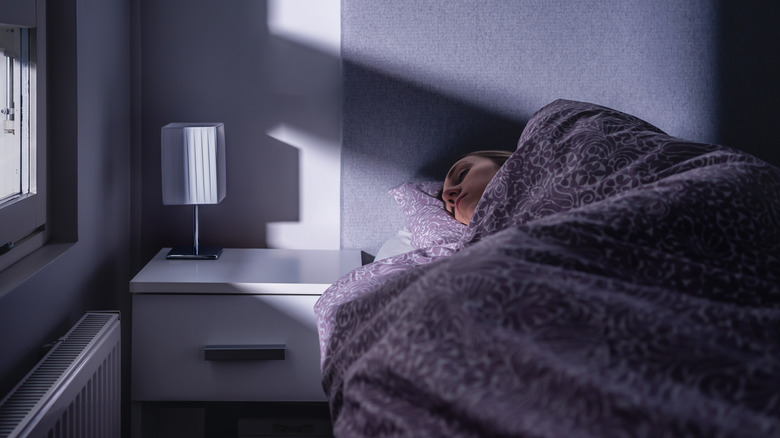Not everyone can turn off the lights, snuggle up in bed, and drift off to restful sleep within a few minutes. Some of us lay awake tossing and turning — counting sheep, focusing on our breath, and trying to empty our minds from the woes of today and the anxieties of tomorrow.
If you’re wondering how to fall asleep quicker without medication, apparently there’s something you can do with your eyes to help. Roll them. Yes, you read that right. Remember what you used to do when you were small and your mother was lecturing you — for the 10th time — about the dangers of talking to strangers? You rolled your eyes in frustration.
According to certified sleep science coach and founder of SleepZoo, Chris Brantner (via Bustle), “The idea is that rolling your eyes simulates the movement your eyes make when sleeping. So by rolling your eyes, it might help produce melatonin and get you to sleep.” Why is melatonin important for sleep?
Melatonin regulates your sleep-wake cycle

Melatonin is the hormone that regulates your sleep-wake cycle and keeps your circadian rhythm in check, per Sleep Foundation. Interestingly, melatonin can be produced inside your body (endogenous melatonin) and introduced from outside your body too (exogenous melatonin).
In addition to taking the synthetic stuff that is largely consumed via pills and other forms of medication, we can boost levels of melatonin by eating certain kinds of foods, like nuts (almonds, hazelnuts, and pistachios), milk, eggs, and fish, all of which contain a high concentration of the stuff, according to CNBC Make It. Taking a warm bath at night, getting sufficient sunlight during the day, and limiting your exposure to artificial lights like blue lights can help boost melatonin in your system too (per Medical News Today). If you’re doing all of this already and still struggle to fall asleep quicker, try the rolling-your-eyes hack and see if it works.
Melatonin is linked to what’s known as rapid eye movement (REM) sleep, which is characterized by rapid, random eye movements (per Cleveland Clinic). Rolling your eyes intentionally in the same way that you do doing REM sleep may help trigger its production, according to Mattress Advisor.
What rapid eye movement sleep might mean
According to a 2024 study published in Nature Communications, rapid eye movement (REMs) during sleep at night could be because we’re dreaming.
“We focused on the electrical activities of individual neurons in the medial temporal lobe, a set of brain regions that serve as a bridge between visual recognition and memories,” shared the lead author, Yuval Nir (via Science Alert). When researchers compared the eye movement that happens during sleep with what happens when people are shown new images while they’re awake, they found similarities. “The electrical brain activity during rapid eye movements in sleep were highly similar to those occurring when people were presented with new images,” added Nir.
Perhaps the eyes really can be the windows to your inner self. They can also be used for handy tricks you can try if you can’t fall asleep at night.